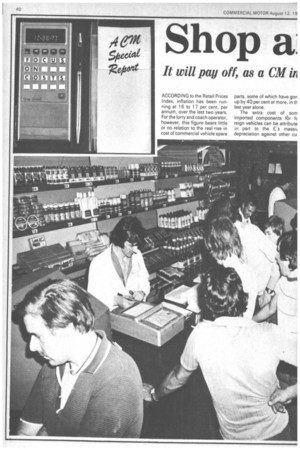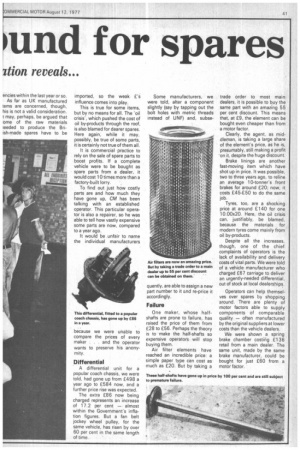Shop a ound for s ares
Page 42

Page 43

If you've noticed an error in this article please click here to report it so we can fix it.
It will pay off, as a CM Won reveals...
ACCORDING to the Retail Prices Index, inflation has been running at 1 6 to 1 7 per cent, per annum, over the last two years. For the lorry and coach operator, however, this figure bears little or no relation to the real rise in cost of commercial vehicle spare parts, some of which have gor up by 40 per cent or more, in th last year alone.
The extra cost of som imported components fiSr fc reign vehicles can be attribute in part to the £.'s massik depreciation against other cu encies within the last year or so.
As far as UK manufactured terns are concerned, though, his is not a valid consideration. t may, perhaps, be argued that ;ome of the raw materials ieeded to produce the Briish-made spares have to be imported, so the weak Us influence comes into play.
This is true for some items, but by no means for all. The 'oil crisis', which pushed the cost of oil by-products through the roof, is also blamed for dearer spares. Here again, while it may, possibly, be true of some parts, it is certainly not true of them all.
It is commercial practice to rely on the sale of spare parts to boost profits. If a complete vehicle were to be bought as spare parts from a dealer, it would cost 10 times more than a factory-built lorry.
To find out just how costly parts are and how much they have gone up, CM has been talking with an established operator. This particular operator is also a repairer, so he was able to tell how vastly expensive some parts are now, compared to a year ago.
It would be unfair to name the individual manufacturers because we were unable to compare the prices of every maker . . and the operator wants to preserve his anonymity.
Differential
A differential unit for a popular coach chassis, we were told, had gone up from £498 a year ago to £584 now, and a further price rise was expected.
The extra £86 now being charged represents an increase of 17.2 per cent — almost within the Government's inflation figures. But a fan belt jockey wheel pulley, for the same vehicle, has risen by over 60 per cent in the same length of time. Some manufacturers, we were told, alter a component slightly (say by tapping out the bolt holes with metric threads instead of UNF) and, subse quently, are able to assign a new part number to it and re-price it accordingly.
Failure
One maker, whose halfshafts are prone to failure, has raised the price of them from £28 to £56. Perhaps the theory is to make the half-shafts so expensive operators will stop buying them.
Air filter elements have reached an incredible price: a simple paper type can cost as much as £20. But by taking a trade order to most main dealers, it is possible to buy the same part with an amazing 55 per cent discount. This means that, at £9, the element can be bought even cheaper than from a motor factor.
Clearly, the agent, as middleman, is taking a large share of the element's price, as he is, presumably, still making a profit on it, despite the huge discount.
Brake linings are another fast-moving item which have shot up in price. It was possible, two to three years ago, to reline an average 10-tonner's front brakes for around £20; now, it costs £45-£50 to do the same job.
Tyres, too, are a shocking price at around £140 for one 10.00x20. Here, the oil crisis can, justifiably, be blamed, because the materials for modern tyres come mainly from oil by-products.
Despite all the increases, though, one of the chief complaints of operators is the lack of availability and delivery costs of vital parts. We were told of a vehicle manufacturer who charged £67 carriage to deliver an urgently-needed differential, out of stock at local dealerships.
Operators can help themselves over spares by shopping around. There are plenty of motor factors able to supply components of comparable quality — often manufactured by the original suppliers at lower costs than the vehicle dealers.
We were shown a spring brake chamber costing £136 retail from a main dealer. The same unit, made by the same brake manufacturer, could be bought for just £60 from a motor factor.




















































































